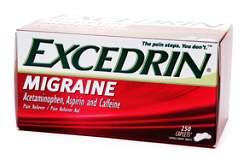Excedrin Migraine (and other specific drugs)
In a recent article, Dr Brent Bauer (director of the Complementary and Integrative Medicine Program at the Mayo Clinic) noted that more and more supplements are being marketed to target specific health problems. As you know, it’s not just supplements, but the mainstream painkillers as well. Is this good or bad?
Well, it’s helpful to target the exact condition you have – the medication is likely to be more effective. You don’t want to take medicine for something you don’t have.
But sometimes that can be the problem. Trisha Brandon, a Consumer Reports tester in the US, was quoted in a recent article: A lot of over-the-counter medicines often have multiple ingredients to treat several symptoms at once, but you may not need all of those ingredients.
Ok, so it’s important to know what you’re taking and why. Brandon also says: People are self-diagnosing and they’re sometimes getting it wrong. Or, they may be taking something that’s too strong for them.
For example, some people may think they have a migraine just because they have a bad headache. Or, they may take something like Excedrin Migraine for a migraine attack, not realizing it’s specifically targeted to treat headaches from migraine, and not other symptoms.
So it pays to learn about these painkillers – stop and read this recent article about Excedrin Migraine.

